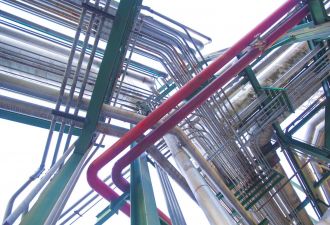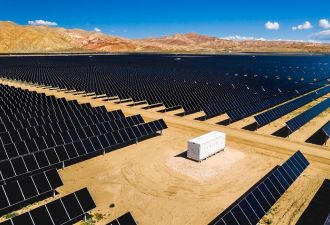Recently, it has been tough sledding for Masdar, the green city under development in Abu Dhabi. But before we get into the latest developments, a little backstory...
Act 1: Wide-eyed optimism
Back in 2006, the government of Abu Dhabi initially announced its plans to build "Masdar City," with the following goals:
- Estimated completion date of 2016, at a cost of $22B
- 6-square-kilometer walled city about 17 km from Abu Dhabi, with a targeted population of 47,500 people, and 1,500 businesses
- 100% Renewable Energy (PV, wind, biomass and geothermal)
- Car-free, as travel will be provided by walking, biking, mass transit and a personal rapid transit system
- Zero carbon emissions
- Zero waste (recycling with biological waste used for fertiliser, and other waste incinerated to generate power)
- 80% of water recycled
- A world-class research university, the Masdar Institute of Science & Technology (MIST), that will be assisted by MIT
- 200 MW of solar PV (10 MW field + 190 MW rooftop)
- All construction to be power by a 40 to 60 MW solar PV plant, to be built by Conergy
- An on-site PV module manufacturer, Masdar PV
The vision: a modern-day Garden of Eden...
Act 2: Cracks in the armor
Fast forward to 2009.
Construction is moving forward (click for video), but at a much slower pace than planned. A 10 MW solar PV plant has been built by Environmena, but there are some issues.
One of the concerns is sandstorms, and the resulting dust that would accumulate in the air and on the panels, thus hampering output. For example, in August 2009, when the amount of suspended dust in the air was between 1,500 and 2,000 parts per million (more than 10 times higher than normal), the Masdar solar plant was functioning at 40% below its capacity. Within a week, the panels were cleaned and back to normal output, but the concern remains, as frequent sandstorms would require more cleanings, which would in turn increase the operating and maintenance costs.
Don't mind the dust
According to Khaled Awad, the director of Masdar City, “Dust storms have the same impact on a PV panel’s performance as cloud cover. In Abu Dhabi, we have a number of dust storms during the year, but compared with the level of cloud cover that European countries such as Germany receive, the performance in Abu Dhabi is far superior. In fact, on average, a solar module installed in Abu Dhabi will generate twice as much as [one installed in] a cloudy region in Europe.”
Act 3: Houston, we have a problem
January 2010: Masdar announced that the project would not be finished until 2020 at the earliest.
March 2010: As a result of the weak property market in Abu Dhabi, Masdar revisits its city plan. Masdar concedes that much of the electricity for the city will need to be imported, instead of being produced on site. Project leaders also announced that the electric transport pods are not likely to be used throughout the entire city.
May 10, 2010: The solar manufacturing arm of the city, Masdar PV, fired both its CEO & COO.
June 21, 2010: Tariq Ali, head of research at MIST, resigned after a year in the post.
July 1, 2010: Responding to some of the negative press, Masdar CEO Sultan al-Jaber comments that Masdar will not be scaled back. There are significant delays across the project, and a revised master plan for the city is thought to be imminent. Thus far, the city contains only the Masdar Institute of Science and Technology, where tuition is free. (Editor's note: The Masdar Institute is functioning. A second class of grad students from around the world will arrive in the fall. However, most of the classes and research work still take place in nearby buildings because construction is ongoing.)
July 13, 2010: John Perkins, the provost of the Masdar Institute and its public face, resigns.
July 21, 2010: Applied Materials announces the termination of its SunFab amorphous silicon equipment business (Masdar PV had planned to use their lines to manufacture PV modules).
Act 4: Amidst the grey skies, a few rays of hope
On June 9, 2010, representatives of the Masdar project announce plans to construct a large scale concentrating solar plant, with construction to start as soon as 3Q 2010, and project completion slated for 3Q 2012. The project, “Shams 1,” is a 100 MW concentrating solar power (CSP) plant in Madinat Zayed, 75 miles southwest of Abu Dhabi. It will use parabolic trough technology supplied by Abengoa Solar. Ownership of the project will be 60% Masdar, 20% Abengoa, and 20% Total. Capacity of the plant is planned to be increased to 2,000 MW in the future. Project cost is estimated at $600M, which equates to $6 per watt. The government of Abu Dhabi will provide a long-term Green Power Agreement, and the electricity produced will be sold to Abu Dhabi Water and Electricity Company (ADWEC) under a long-term contract.
The 100 MW concentrating solar project is moving forward, with construction to begin this quarter.
Act 5: Abu Dhabi is loaded, and can afford to foot the bill. But if they build it, will the tenants come?
The Masdar project is backed by the government of Abu Dhabi, which is the nation-state equivalent of Daddy Warbucks. Abu Dhabi has sovereign wealth funds estimated at $650 billion, so it could bankroll the entire $22B Masdar bill just from the interest they earn on their holdings in one year. The entire UAE is listed as having the seventh-largest oil reserves in the world (ahead of Russia and the U.S.), so the oil money will keep flowing in for quite a while.
But the Masdar City concept only makes sense if businesses will locate there, providing jobs and attracting employees. The building boom in Abu Dhabi over the last decade has added substantial amounts of commercial real estate, so finding tenants willing to relocate to Masdar might prove more difficult than originally envisioned. According to research by Tasweek Real Estate, average apartment prices in Abu Dhabi have fallen 40% to 50% from their peak. Essentially, the supply/demand balance for real estate in Abu Dhabi has shifted significantly in favor of property buyers.
In the film Field of Dreams, Kevin Costner's character is encouraged to “Build it, and they will come.” Abu Dhabi had a similar vision, but now appears to be having second thoughts.



